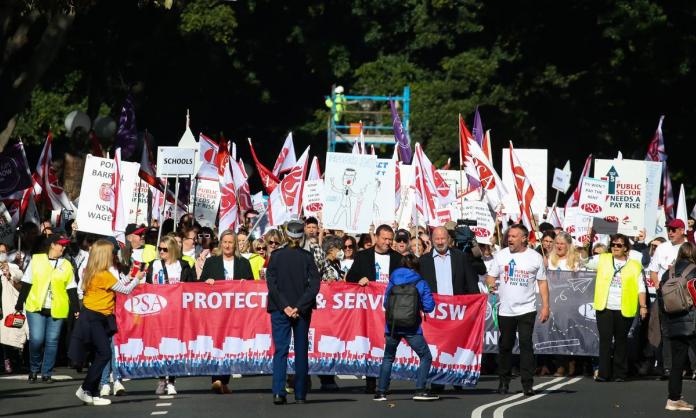Public sector workers in New South Wales went on strike today, demanding a pay rise. Chants of “3 percent won’t pay the rent!” rang out from thousands of Public Service Association (PSA) union members gathered outside the state parliament.
While offering verbal thanks to frontline workers, the Liberal government used the pandemic as an opportunity to attack wages. “There was so much pressure, we couldn’t work from home in the pandemic”, a striking school support worker told Red Flag. “Now that we’re back [in schools] everyone I know at work has had COVID. I love my job. But loving your job shouldn’t be a reason for being paid poorly.”
The PSA called the long-overdue strike following actions by teachers, nurses and railway workers. The union covers an eclectic mix of workers from areas such as the State Library, national parks, office workers in state agencies, school administration and support staff, museum and gallery staff, prison officers and more.
“This is the first state-wide industrial action from the PSA I can remember”, Chris Moore, a PSA member of 23 years, told Red Flag. “It’s a great start, and combined and coordinated with other public sector unions, such as nurses, teachers and transport workers, it can win”.
More than a thousand new members have joined the union since the strike was called, illustrating the appetite for action.
In 2020, the Industrial Relations Commission increased public sector wages by only 0.3 percent—a wage cut in real terms—after the government unsuccessfully tried to impose a complete wage freeze.
This came after a decade of capped wages. In 2011, Liberal Premier Barry O’Farrell introduced a yearly 2.5 percent wage cap. Superannuation increases were brought under the cap in 2013.
The PSA claim is for at least 5.2 percent for all public sector workers, with any increase to superannuation paid on top of that.
Always happy to feather their own nests, this year almost every member of the NSW government was given a pay increase of between $5,000 and $150,000. Premier Dominic Perrottet defended the decision, arguing: “If you take on extra roles and responsibilities in your parliamentary duties there is an additional entitlement that’s provided in respect of those roles”.
Apparently, this rule applies only to well-paid politicians, not public service workers.
“The bosses always have an excuse to not give us a pay rise, when times are good and when times are tough”, Megan, a striking school learning support officer, told Red Flag.
“That’s why I’m so pleased to be part of a strike of thousands of workers standing up and fighting for it ourselves. I’ve seen my workmates stretched to the limit. I’ve seen fellow teachers bring in frozen meals because there’s not enough time in the day after hours spent planning lessons to be able to look after themselves. Too many workers in the sector are on short-term contracts or are casual. Why is there money for Perrottet to give himself and his mates big pay rises while government workers live from paycheck to paycheck?”
A recent study by Griffith University’s David Peetz found that the 5.1 percent rise in inflation means public sector workers are losing thousands under the current pay cap. The real wages of a schoolteacher on a band two salary will slide backwards by $2,509 this financial year, under current conditions. A second-year paramedic will lose $2,015, while a registered nurse will be $1,986 worse off.
Perrottet made an insulting offer this week to lift the wages cap to 3 percent, including superannuation. Thousands of union members showed that we won’t accept yet another pay cut. “The offer of 3 percent is completely inadequate”, Chris Moore said. “It’s well below inflation, includes the superannuation increase, and would keep wages suppressed beyond the public sector. The wage cap needs to go.”
Perrottet also offered a $3,000 one-off “thank you” payment for permanent healthcare workers—with nothing for those who risked their lives on casual or fixed-term contracts—but is still refusing to implement nurse to patient ratios. A one-off payment won’t increase wages long term, and the narrow offer leaves behind many public sector workers who worked through COVID, bushfires, floods and more.
We deserve a wage rise above inflation. It will take more than a single day of striking to break the pay cap. As one striker said: “It has to be joint action to be really effective. Shut the transport down. The whole city could be at a standstill”.
It’s time to strike alongside other public sector unions until we win.










